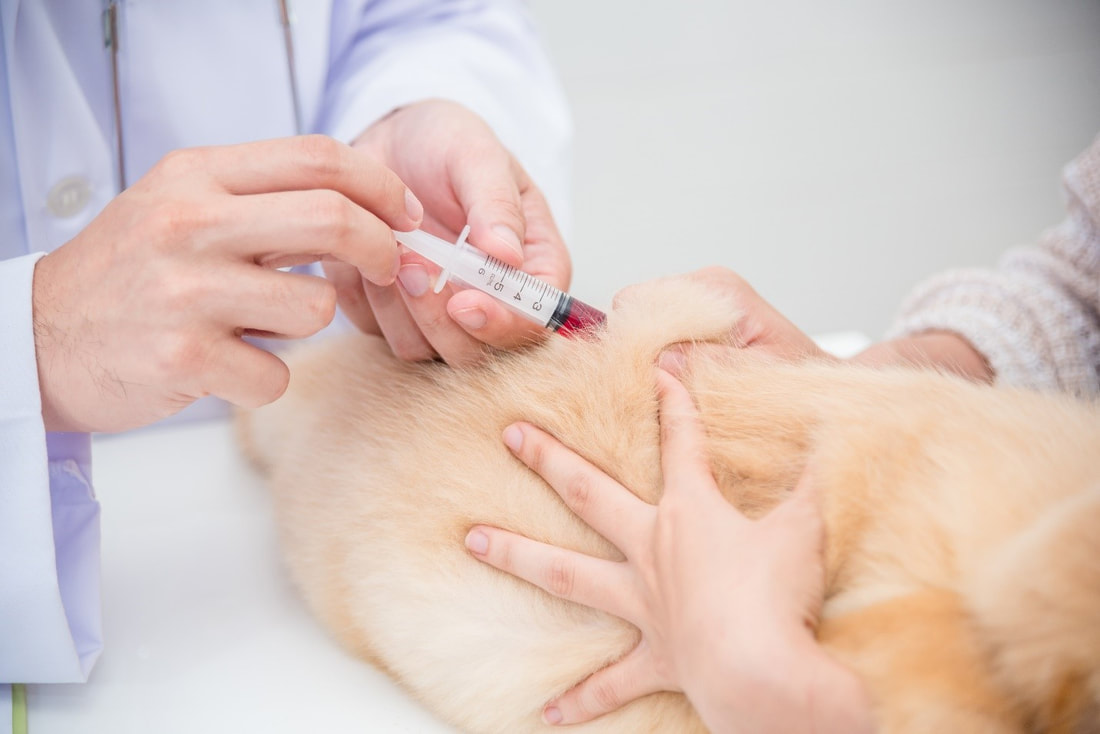|
Every year, around 6.8 million people in the United States donate blood to help those in need. While the need for human blood is well-known, many pet owners have no idea that dog blood is also in high-demand by veterinary professionals. In fact, many dog owners are shocked to know that donating their dog’s blood is even a possibility. Why is Blood Donation Important?Blood transfusions are live-saving procedures. The blood that your dog donates can be used to save the lives of other dogs. Dogs often need blood transfusions after surgery or trauma, such as being hit by a car. These transfusions can save dogs of all breeds, ages, and genders. Donor dogs help save the lives of other dogs with their contribution to blood banks around the country. How Does Dog Blood Donation Work?Pet owners are often concerned about the canine blood donation process—and for a good reason! No pet owner wants to subject their pet to something that is painful or stressful. However, the procedure for blood donation is very simple. Most dogs are put under a mild sedative, which keeps them sit and calm during the donation process. Dogs with long fur will need to have a small patch of fur shaved off to allow for a clean insertion of the needle. The rest of the process works a lot like it does for humans. The whole ordeal usually only takes between 30 and 60 minutes. Dogs can donate blood as frequently as every three weeks, but most programs will only ask for donations five or six times a year. Some places will also ask that pet owners are willing to bring their pet in on short notice when a patient is in need of a blood transfusion. This is often dependent on whether the blood is being donated at an emergency hospital or a donation center. Is My Dog Eligible to Donate Blood?Much like human blood donation, there are certain requirements that dogs must meet before they are allowed to donate blood. Dogs are expected to be between one and six years old and in good health. Typically, dogs are required to be spayed or neutered. All eligible blood donors will need to be up-to-date on vaccinations and preventatives for heartworm, fleas, and ticks. Required vaccinations include rabies, Bordatella, and DA2PP. Only dogs that weigh more than 50 pounds are eligible for blood donation.
There is also a donor screening process that makes sure that your pet doesn’t carry any disease that could be passed along through their blood. Dogs that are eligible to give blood must never have tested positive for any of the following blood-borne diseases:
Dogs are not eligible to donate blood if they have ever received a blood transfusion. Certain breeds are also ineligible for blood donations due to issues with blood storage or genetic conditions. Temperament screenings may also be required before a blood donation is accepted.
8 Comments
12/5/2021 02:47:16 pm
Reply
2/1/2022 07:18:22 am
It runs very fast, barks loudly and attacks the strangers. A dog saves the life of the master from danger. One can find dogs everywhere in the world. Dogs are a very faithful animal. It has a sharp mind and a strong sense of hearing smelling the things.
Reply
9/25/2022 11:59:21 pm
Dog car bed is made of soft fur and pp cotton with a removable and washable cover. the best bed for traveling with pups. I buy it from Pups n Beds and really appreciate it for the best quality...
Reply
11/23/2022 07:37:30 am
Reply
4/30/2023 05:05:42 am
Dogs are also intelligent animals that can be trained to perform a wide range of tasks, including obedience training, agility training, and even assistance to people with disabilities.
Reply
5/9/2023 12:30:52 am
Dogs are highly intelligent creatures that have been bred and trained to perform a wide range of tasks, including hunting, herding, and assisting people with disabilities. With their exceptional senses of smell and hearing, they can detect changes in their environment that humans cannot, making them ideal for many different jobs.
Reply
7/29/2023 01:52:14 am
A centrifuge may be used to separate collected blood into plasma and packed red blood cells. Red blood cells are coupled with a solution to extend their life and health, giving them a lifespan of 35 days, after they have been separated. The plasma is separated into a storage bag and rapidly frozen, giving it a shelf life of one year. However, in some circumstances (such as in cases of rodenticide toxicity), it can be utilized for up to five years.
Reply
The joyous moments shared with pets become cherished memories etched into the tapestry of our lives. From the jubilant welcome they give upon our return home to the quiet moments of companionship shared by the fireplace, these memories become a treasure trove that we hold dear. Their playful antics and endearing quirks bring laughter and light into our lives, reminding us not to take ourselves too seriously.
Reply
Leave a Reply. |
Categories
All
Archives
May 2023
|





 RSS Feed
RSS Feed

